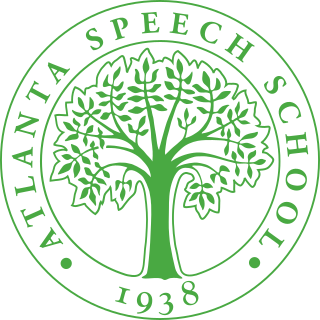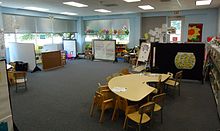
Hearing loss is a partial or total inability to hear. Hearing loss may be present at birth or acquired at any time afterwards. Hearing loss may occur in one or both ears. In children, hearing problems can affect the ability to acquire spoken language, and in adults it can create difficulties with social interaction and at work. Hearing loss can be temporary or permanent. Hearing loss related to age usually affects both ears and is due to cochlear hair cell loss. In some people, particularly older people, hearing loss can result in loneliness.

A cochlear implant (CI) is a surgically implanted neuroprosthesis that provides a person who has moderate-to-profound sensorineural hearing loss with sound perception. With the help of therapy, cochlear implants may allow for improved speech understanding in both quiet and noisy environments. A CI bypasses acoustic hearing by direct electrical stimulation of the auditory nerve. Through everyday listening and auditory training, cochlear implants allow both children and adults to learn to interpret those signals as speech and sound.
Lip reading, also known as speechreading, is a technique of understanding a limited range of speech by visually interpreting the movements of the lips, face and tongue without sound. Estimates of the range of lip reading vary, with some figures as low as 30% because lip reading relies on context, language knowledge, and any residual hearing. Although lip reading is used most extensively by deaf and hard-of-hearing people, most people with normal hearing process some speech information from sight of the moving mouth.
Oralism is the education of deaf students through oral language by using lip reading, speech, and mimicking the mouth shapes and breathing patterns of speech. Oralism came into popular use in the United States around the late 1860s. In 1867, the Clarke School for the Deaf in Northampton, Massachusetts, was the first school to start teaching in this manner. Oralism and its contrast, manualism, manifest differently in deaf education and are a source of controversy for involved communities. Listening and Spoken Language, a technique for teaching deaf children that emphasizes the child's perception of auditory signals from hearing aids or cochlear implants, is how oralism continues on in the current day.
Unilateral hearing loss (UHL) is a type of hearing impairment where there is normal hearing in one ear and impaired hearing in the other ear.

Christopher James Christie is an American politician and former federal prosecutor who served as the 55th governor of New Jersey from 2010 to 2018. A member of the Republican Party, he was the United States Attorney for New Jersey from 2002 to 2008 and a Morris County commissioner from 1995 to 1997. He was a candidate for the Republican presidential nomination in 2016 and 2024.

The Atlanta Speech School is a language and literacy school located in Atlanta, Georgia, established in 1938. The school provides educational and clinical programs. The Atlanta Speech School's Rollins Center provides professional development for teachers and educators in partner schools and preschools. The Rollins Center focuses on the eradication of illiteracy. The Rollins Center has an online presence called Cox Campus, which is an online learning environment with coursework targeted for the education of children age 0–8.
Singapore Sign Language, or SgSL, is the native sign language used by the deaf and hard of hearing in Singapore, developed over six decades since the setting up of the first school for the Deaf in 1954. Since Singapore's independence in 1965, the Singapore deaf community has had to adapt to many linguistic changes. Today, the local deaf community recognises Singapore Sign Language (SgSL) as a reflection of Singapore's diverse culture. SgSL is influenced by Shanghainese Sign Language (SSL), American Sign Language (ASL), Signing Exact English (SEE-II) and locally developed signs.

Cortical deafness is a rare form of sensorineural hearing loss caused by damage to the primary auditory cortex. Cortical deafness is an auditory disorder where the patient is unable to hear sounds but has no apparent damage to the structures of the ear. It has been argued to be as the combination of auditory verbal agnosia and auditory agnosia. Patients with cortical deafness cannot hear any sounds, that is, they are not aware of sounds including non-speech, voices, and speech sounds. Although patients appear and feel completely deaf, they can still exhibit some reflex responses such as turning their head towards a loud sound.
Auditory-verbal therapy is a method for teaching deaf children to listen and speak using hearing technology. Auditory-verbal therapy emphasizes listening and seeks to promote the development of the auditory brain to facilitate learning to communicate through talking. It is based on the child's use of optimally fitted hearing technology.
Prelingual deafness refers to deafness that occurs before learning speech or language. Speech and language typically begin to develop very early with infants saying their first words by age one. Therefore, prelingual deafness is considered to occur before the age of one, where a baby is either born deaf or loses hearing before the age of one. This hearing loss may occur for a variety of reasons and impacts cognitive, social, and language development.
The history of deaf education in the United States began in the early 1800s when the Cobbs School of Virginia, an oral school, was established by William Bolling and John Braidwood, and the Connecticut Asylum for the Deaf and Dumb, a manual school, was established by Thomas Hopkins Gallaudet and Laurent Clerc. When the Cobbs School closed in 1816, the manual method, which used American Sign Language, became commonplace in deaf schools for most of the remainder of the century. In the late 1800s, schools began to use the oral method, which only allowed the use of speech, as opposed to the manual method previously in place. Students caught using sign language in oral programs were often punished. The oral method was used for many years until sign language instruction gradually began to come back into deaf education.
Lexington School and Center for the Deaf comprises the Lexington School for the Deaf, the Lexington Hearing and Speech Center, Lexington Vocational Services, and the Lexington Center for Mental Health in New York City, aimed at serving the deaf and hard of hearing community.
Language acquisition is a natural process in which infants and children develop proficiency in the first language or languages that they are exposed to. The process of language acquisition is varied among deaf children. Deaf children born to deaf parents are typically exposed to a sign language at birth and their language acquisition follows a typical developmental timeline. However, at least 90% of deaf children are born to hearing parents who use a spoken language at home. Hearing loss prevents many deaf children from hearing spoken language to the degree necessary for language acquisition. For many deaf children, language acquisition is delayed until the time that they are exposed to a sign language or until they begin using amplification devices such as hearing aids or cochlear implants. Deaf children who experience delayed language acquisition, sometimes called language deprivation, are at risk for lower language and cognitive outcomes. However, profoundly deaf children who receive cochlear implants and auditory habilitation early in life often achieve expressive and receptive language skills within the norms of their hearing peers; age at implantation is strongly and positively correlated with speech recognition ability. Early access to language through signed language or technology have both been shown to prepare children who are deaf to achieve fluency in literacy skills.
Deafness has varying definitions in cultural and medical contexts. In medical contexts, the meaning of deafness is hearing loss that precludes a person from understanding spoken language, an audiological condition. In this context it is written with a lower case d. It later came to be used in a cultural context to refer to those who primarily communicate through sign language regardless of hearing ability, often capitalized as Deaf and referred to as "big D Deaf" in speech and sign. The two definitions overlap but are not identical, as hearing loss includes cases that are not severe enough to impact spoken language comprehension, while cultural Deafness includes hearing people who use sign language, such as children of deaf adults.
HASA is a social benefit 501(c)(3) organization located in Baltimore, Maryland, that specializes in facilitating communication. Established in 1926, the organization provides special education services through Gateway School, audiology and speech-language services through its Clinical Services Department, and interpreting services for the deaf through its CIRS Interpreting Department.
Language deprivation in deaf and hard-of-hearing children is a delay in language development that occurs when sufficient exposure to language, spoken or signed, is not provided in the first few years of a deaf or hard of hearing child's life, often called the critical or sensitive period. Early intervention, parental involvement, and other resources all work to prevent language deprivation. Children who experience limited access to language—spoken or signed—may not develop the necessary skills to successfully assimilate into the academic learning environment. There are various educational approaches for teaching deaf and hard of hearing individuals. Decisions about language instruction is dependent upon a number of factors including extent of hearing loss, availability of programs, and family dynamics.
Ciwa Griffiths was an American speech therapist and pioneer of auditory-verbal therapy and universal neonatal hearing screening.
Helen Louise Hulick Beebe was an American educator and pioneer of auditory-verbal therapy. In 1938, she made headlines when a judge jailed her for wearing trousers while appearing as a witness in court.
James M. Oleske is an American pediatrician and HIV/AIDS researcher who is the emeritus François-Xavier Bagnoud (FXB) Professor of Pediatrics at Rutgers New Jersey Medical School in Newark, New Jersey. He is best known for his pioneering work in identifying HIV/AIDS as a pediatric disease, and treating and researching it beginning in the 1980s. He published one of the first articles identifying HIV/AIDS in children in JAMA in 1983 and was a co-author of one of the articles by Robert Gallo and others identifying the virus in Science in 1984.








